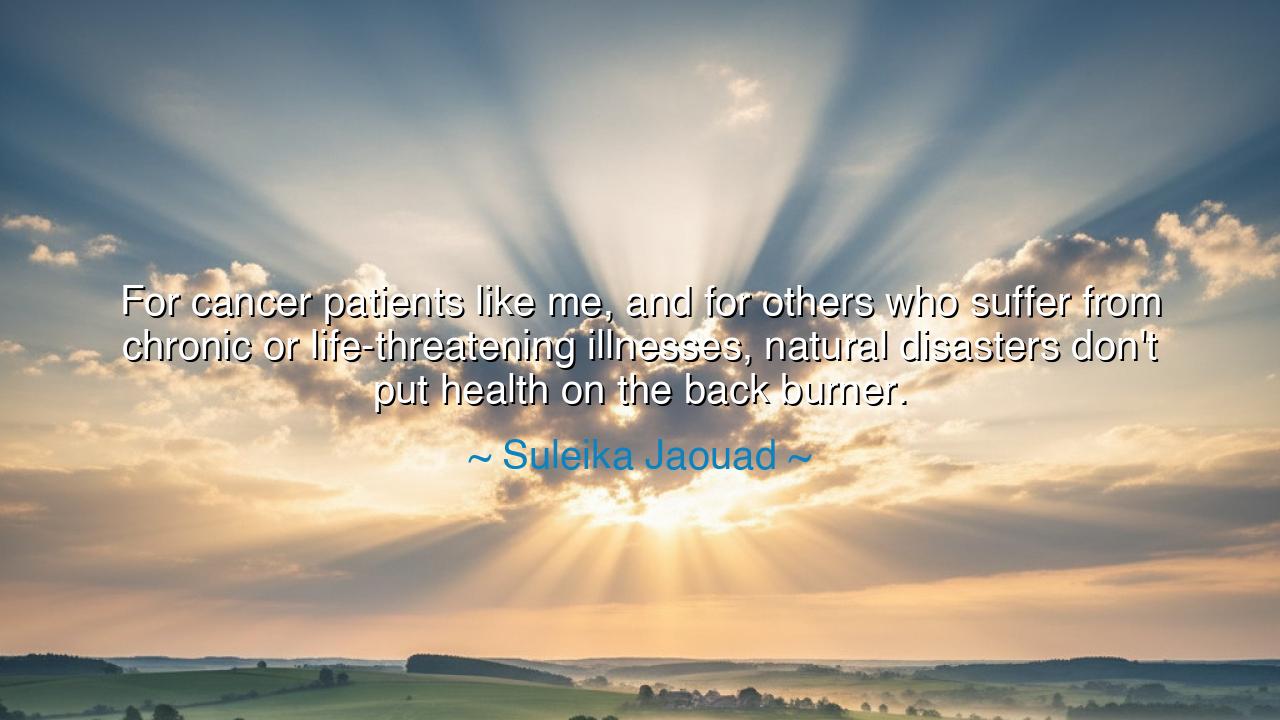
For cancer patients like me, and for others who suffer from
For cancer patients like me, and for others who suffer from chronic or life-threatening illnesses, natural disasters don't put health on the back burner.






The words of Suleika Jaouad—“For cancer patients like me, and for others who suffer from chronic or life-threatening illnesses, natural disasters don’t put health on the back burner.”—are both tender and thunderous. They remind us that while the world may tremble under catastrophe, the inner storms of the body do not cease. Her voice, calm yet resolute, is the voice of one who has looked suffering in the eye and learned that life’s fragility is constant, not episodic. She speaks for those who carry battles within them even as the outer world collapses—those whose illnesses do not pause for hurricanes, earthquakes, or fires, for pain knows no calendar and disease bows to no disaster.
At the heart of her words lies a profound truth: the suffering of the sick is unrelenting, unbound by the chaos that consumes others. When the earth shakes or the sky darkens, the healthy may run, rebuild, or recover—but for those already fighting for survival, every day is already a natural disaster within the body. Jaouad’s reflection reveals a duality: that while calamity may be temporary for some, for others it is a way of life. Her message carries the quiet wisdom of endurance, a reminder that resilience is not forged in moments of peace, but in the long, ceaseless struggle to stay alive when the world forgets you.
The origin of this quote comes from Jaouad’s lived experience—her long journey through leukemia, a disease that tested not only her body but her soul. As she underwent chemotherapy and isolation, she wrote from her hospital bed about what it means to live between worlds—the world of the sick and the world of the well. When natural disasters struck during her treatment, she witnessed how the attention of society shifted outward, as it must, to those caught in flood or fire. Yet for her, and for millions like her, the disaster was ongoing. Her insight is born not of complaint but of compassion—a recognition that the world’s emergencies must never eclipse the silent crises of the ill.
This truth has echoed through all of human history. Consider the story of Florence Nightingale, who, during the Crimean War, tended to soldiers dying of disease and infection while cannon fire raged beyond the hospital walls. To her, the front line was not the battlefield but the sickroom. Amidst the roar of war, she taught the world that healing is itself an act of heroism, one that must continue even when nations crumble. In this same spirit, Jaouad reminds us that when disaster strikes, we must not forget those already enduring invisible wars within—the cancer patient, the diabetic, the disabled, the chronically ill. Their fight continues in silence, regardless of the world’s noise.
Her words also carry a deeper spiritual resonance: that health is sacred, and it must never be treated as secondary. To those who live in wellness, she offers a quiet plea—do not wait for illness to teach you gratitude. Value your body’s strength before it is tested. To those who suffer, she offers solidarity—the knowledge that they are not forgotten, that their persistence is a form of grace. Even when the sky falls, tending to one’s health remains an act of defiance, a declaration that life, though fragile, is still worthy of protection. In this way, Jaouad transforms pain into purpose and fear into faith.
Yet, her reflection is not only about illness—it is about the constancy of care. When the external world is shaken, we are reminded of the fragility of all systems: hospitals may close, medicines may run short, roads may be blocked. And yet, in those moments, the true strength of humanity is revealed through compassion—through those who continue to bring medicine to the sick, who carry patients to safety, who remember that every heartbeat saved is a victory over chaos. Her words call us to such remembrance: that civilization itself is measured not by how it treats the strong in peace, but how it shelters the vulnerable in crisis.
Therefore, let this be the lesson: do not abandon the sick when the world trembles, for they already stand at the edge of survival. When storms rise or fires spread, extend your hand not only to the displaced, but to the diseased, for they, too, fight a storm that does not abate. And to those who live with illness, let Jaouad’s voice be a beacon—proof that the human spirit can endure both the tempest outside and the tempest within.
And so, my children, remember this eternal truth: compassion must not yield to calamity. For the true strength of a society lies not in its walls or weapons, but in its tenderness toward the weakest. The world will shake, the winds will howl, but if we continue to care—if we continue to see the invisible suffering—then even amid disaster, humanity itself will stand unbroken.






AAdministratorAdministrator
Welcome, honored guests. Please leave a comment, we will respond soon